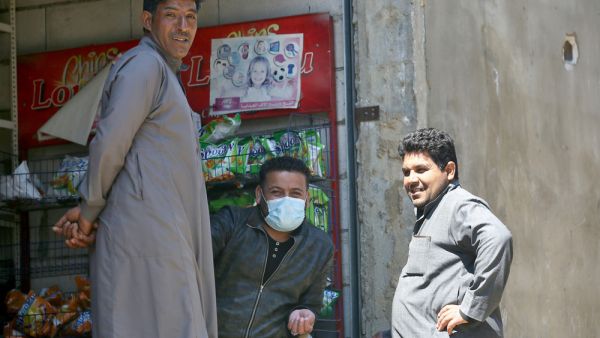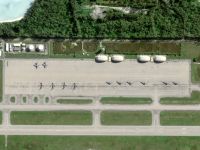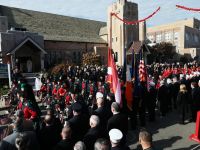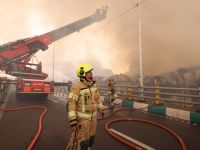The Cabinet is set to meet next week to take stringent preventive measures in a bid to stem a frightening surge in the coronavirus infections, an official source said Sunday.
Ahead of the Cabinet session, slated for Tuesday at Baabda Palace, the Higher Defense Council will meet on the same day at 9:30 a.m. to make a recommendation for a series of “severe preventive measures” against the spread of the coronavirus pandemic, the source told The Daily Star. The Defense Council’s recommendation will be later approved by the Cabinet, the source said.
Among these measures is the closure of some public places to avoid overcrowding and ensure that people comply with COVID-19 guidelines such as keeping physical distancing and wearing face masks, the source said.
However, the source ruled out the possibility of the Cabinet imposing a total shutdown in the country like what happened in March. “A nationwide lockdown is unlikely for economic reasons as the country is in the midst of a crippling economic and financial crisis,” the source added.
Lebanon Sunday reported a record 168 new coronavirus cases and four more deaths while a member of Parliament confirmed a positive PCR test result that forced the assembly to postpone next week's sessions.
MP George Okeis, from the Lebanese Forces’ parliamentary bloc, said he had taken a test after a senior Foreign Ministry official whom he had met several times this week got infected. Okeis said he had also met this week with several MPs as well as Parliament Speaker Nabih Berri and LF leader Samir Geagea.
Berri immediately suspended meetings at Parliament scheduled for Monday and Tuesday and called on MPs to take PCR tests. Both Berri and Geagea had taken PCR tests whose results were negative.
Also, it was announced Saturday night that courts at the Justice Palace had suspended work and trial sessions were put on hold in line with a decision by the Beirut Bar Association after a female lawyer was infected with the coronavirus.
Sunday's cases, 152 among residents and 16 among arrivals from abroad, took the total of infections up to 3,750. The latest deaths took the number of fatalities to 51.
Lebanon has seen a spike in coronavirus cases since it lifted lockdown measures and reopened the country's only international airport on July 1 to allow thousands of Lebanese expatriates to return home.
Officials have warned that if the spike is not checked quickly, cases could overwhelm the country's hospital as soon as mid-August. They also said they were studying partial closure measures and reiterated calls for people to wear masks.
Health Minister Hamad Hasan warned he would toughen measures as people continue to ignore COVID-19 guidelines. “There will be strict measures and mandatory measures to adhere to ... the issue is not a joke,” Hasan told reporters Saturday after visiting the Baalbeck Governmental Hospital, which had opened up a new wing for coronavirus patients.
He called on security forces to implement laws and rules, fine those who do not wear masks and arrest those who arrive in Lebanon from abroad and do not quarantine.
Dr. Firass Abiad, head of the Rafik Hariri University Hospital, where the bulk of coronavirus patients are being treated, warned that Lebanon was on the brink of losing control of the pandemic.
“I believe we are on the brink of losing control. We need a timeout,” Abiad tweeted, hinting that a full lockdown was needed. “It will allow us to reorganize, get our act together. We won the first battle, but this is a war ... Sometimes one takes a step backward in order to move two steps forward.”
Lebanon’s health sector has been mired with various problems, primarily financial, as the country goes through a severe economic crisis. Many hospitals have laid off medical workers and nurses in the past few months and are suffering in the face of the dramatic collapse of the Lebanese pound's exchange rate against the US dollar.
Other topics on the agenda of the Cabinet session to be chaired by President Michel Aoun is the issue of a forensic audit of the Central Bank’s book, the official source said.
The Cabinet, overriding reservations by Hezbollah ministers, last Tuesday agreed to appoint New York-based firm Alvares & Marsal to conduct a forensic audit of the Central Bank’s accounts, seen as an important reform step while Lebanon negotiates with the International Monetary Fund on a $10 billion bailout package.
The Cabinet also appointed KPMG and Oliver Wayman to carry out a traditional accounting audit of Banque du Liban.
Finance Minister Ghazi Wazni is expected during the Cabinet session to present documents for the signing of the contract with Alvares & Marsal, the source said.
The forensic audit should reveal the scale of losses at BDL and expose evidence of any corruption in its transactions – a prospect that no doubt has many of the country’s ruling elite shifting uncomfortably in their seats. The Cabinet ordered a forensic audit of BDL as a trust building and transparency measure after defaulting on a $1.2 billion Eurobond maturity in March.
Meanwhile, Maronite Patriarch Bechara Boutros al-Rai said his call for declaring Lebanon’s neutrality toward regional and global conflicts was aimed at shoring up internal Lebanese unity.
“The closing week was characterized by more supporters of a project for a system of active and effective neutrality, either in several articles in newspapers, in statements by officials from the patriarch’s seat, or in support from abroad,” Rai said in Sunday’s sermon at the patriarch’s summer residence in the northern town of Diman.
“It was clear that the main and essential goal of a system of active and effective neutrality internally is to strengthen Lebanon’s internal unity, consolidate its entity, sovereignty and independence and bolster national partnership, stability and wise governance in a state, capable with the strength of the Constitution, the [1943 National] Pact, law and institutions, of defending itself against any attack,” Rai said.
“Externally, neutrality is to stay away from entering into regional and international alliances, struggles and wars, especially those that have direct negative effects on the state’s stability,” he added.
Rai said French Foreign Minister Jean-Yves Le Drian, who visited Lebanon this week, had expressed France’s support for his call for Lebanon’s neutrality.
“We were happy with France’s financial aid to the Catholic Francophone schools and its readiness to help Lebanon with the amount earmarked at the CEDRE conference provided that [Lebanon] begins implementing reforms,” Rai said.
After talks with Aoun, Berri and Prime Minister Hassan Diab Thursday, Le Drian said Lebanon must respect its policy of dissociation from regional conflicts and press ahead with reform, telling officials to "help us to help you." The French minister had also met with Rai.
A statement issued by the patriarch’s seat in Bkirki after Le Drian’s meeting with Rai said the French minister had expressed “his appreciation of the patriarch’s initiative, especially since Lebanon’s sovereignty, which France upholds, requires that Lebanon be a neutral country dissociated from struggles and axes.”
France hosted in 2018 the CEDRE conference, where international donors pledged over $11 billion in grants and soft loans to shore up Lebanon’s ailing economy and finance key infrastructure projects in Lebanon. However, the release of the promised aid was contingent on the implementation of a string of key and structural economic and fiscal reforms in Lebanon.
Foreign Minister Nassif Hitti said Lebanese leaders need to enter into “a serious national dialogue” on taking a neutral stance in the region.
Speaking in an interview with Voice of Lebanon radio, Hitti noted that Lebanon is in conflict with Israel and is a founding member of the Arab League. He said that Lebanon is committed to what the Arab League agrees upon regarding finding solutions to the conflict with Israel.
Hitti added that he supports a policy of “positive neutrality,” explaining that this does not mean that Lebanon is neutral in the conflict with Israel, but rather that it distances itself from “the political differences that are storming here and there in the region.”
This article has been adapted from its original source.








